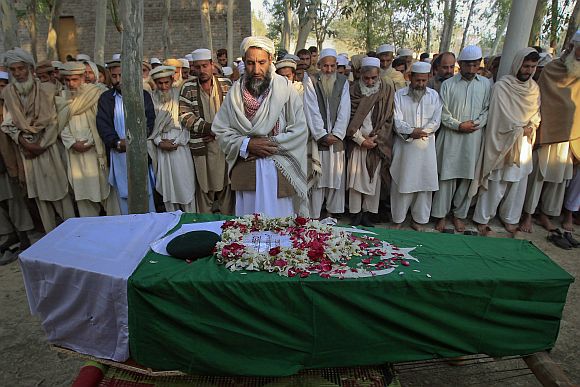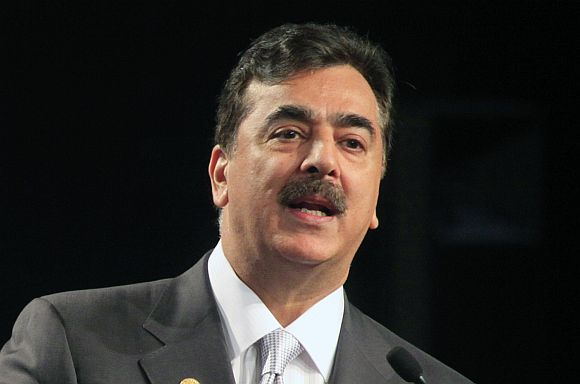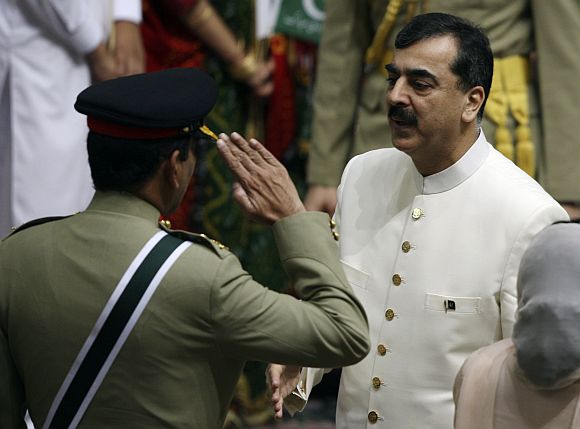 | « Back to article | Print this article |
Pakistan decides to REVISE ties with United States
As Pakistan-United States relations have hit an all-time low in the wake of the November 26 NATO air strike which killed 24 Pakistani soldiers, the decision-makers in Islamabad and Rawalpindi have decided to revamp the country's foreign policy by revising ties with Uncle Sam, reports Amir Mir.
As public anger against the United States ran high everywhere and feelings of bitterness brought people out on the streets in major Pakistani cities following the Mohmand air strike, the government decided to convene an unprecedented conference of Pakistani ambassadors and high commissioners, serving in key capitals of the world.
Giving their recommendations, over two dozen envoys suggested at the Islamabad conference that the government should renegotiate key agreements signed with the United States and its Western allies a decade ago in the wake of the 9/11 attacks. These recommendations are set to further jeopardise the already strained relations between the United States and Pakistan.
Please click NEXT to read further...
Pakistan's recovery from Abbottabad humiliation
The Pakistani establishment had reacted to the NATO strike quite aggressively to stoke what it calls nationalism, and thus staged a remarkable recovery from the humiliation it had suffered at the hands of the Americans in the wake of the covert Abbottabad raid that killed Al Qaeda chief bin Laden.
While reacting strongly after the Abbottabad raid, the Pakistani establishment decided to block the NATO supply route to Afghanistan besides boycotting the Bonn conference on Afghanistan and getting the Shamsi airbase vacated which was once used to carry out drone operations.
The subsequent holding of the conference of ambassadors and high commissioners in Islamabad was meant to form the basis of future military and diplomatic ties with the international community, especially the US.
Notwithstanding the publicly-stated broad scope of the discussions -- "deliberating on different aspects of country's foreign policy" -- it was evident from the agenda of the conference that the proceedings were US-specific.
NATO strike reflects US frustration over Afghanistan
Explaining the purpose of the exercise, which was quite rare in the formulation process of Pakistan's foreign policy, ambassador-designated to Washington Sherry Rehman said at the concluding session of the conference that it would help reorient the foreign policy to be closely linked with the future security and development requirements of the country.
The envoys were briefed by Foreign Minister Hina Rabbani Khar, Finance Minister Abdul Hafeez Sheikh and the Inter Services Intelligence chief Lt Gen Ahmed Shuja Pasha who presented Pakistan's Afghan policy in a tactical framework: "The November 26 attacks on Pakistani check posts reflected frustration on the part of the US over its lack of success in Afghanistan. The Americans have yet to reconcile with the ground realities of the region which are that the US would have to work with Pakistan if it wished to achieve sustainable peace in Afghanistan".
Going by the Pakistani media reports, the recommendations of the conference will be presented to the Parliamentary Committee on National Security, which has been tasked with the review process.
These will then be tabled in a joint session of the parliament, to be addressed by President Asif Zardari upon his return home from Dubai.
However, the Pakistani media has already reported certain important decisions taken during the Islamabad conference.
First of all, Pakistan will renegotiate two key agreements that had been signed with the United States and its Western allies nine years ago by the military regime of General Pervez Musharraf.
Signed in 2002, the agreements allowed transit of supplies and logistics support for the US-led NATO forces, considered crucial at that time for the decade-long battle against the Taliban insurgency in Afghanistan.
'No compromise on Pakistan's sovereignty'
The conference also decided to seek a review of the rules of engagement under US-PK Acquisition and Cross Services Agreement (ACSA) to facilitate reciprocal provision of logistic support, supplies and services.
Some other important decisions taken during the conference included minimising the footprints of the American Central Intelligence Agency in Pakistan, seeking an honourable return of over 3.5 million Afghan refugees from Pakistan and pursuing efforts to stabilise the war-torn Afghanistan, irrespective of Washington's approach.
The conference also decided to seek a formal public apology from the United States over the November 26 attack and firm guarantees that there would be no more violation of Pakistan's sovereignty in the future.
At the concluding session of the conference, Prime Minister Gilani warned that Islamabad won't accept flagrant transgression of its territory like last month's deadly NATO strike.
Gilani's remarks came even as Foreign Minister Hina Rabbani Khar said ongoing review of foreign policy did not mean that Pakistan was going to fight with anyone or that it would snap its relations with the US or any other country.
Referring to the importance of efforts to promote durable stability and peace in Afghanistan, the premier said the aerial attacks on our army border posts constituted a huge setback to the prospects of much-needed cooperation between all important stakeholders.
"Our cooperation with the US and NATO was based on respect for Pakistan's sovereignty. Respect for Pakistan's territorial integrity is a base line and there would be no compromise on the country's sovereignty, dignity and national honour", the prime minister added.
Pak has become the chief whipping boy for US fury
On the other hand, the Obama administration has already started bullying Pakistan. A US Congressional panel has decided to freeze $700 million in aid to Pakistan in a punitive measure that aims to stop the spread of improvised-explosive devices in Afghanistan, raw material for which, US lawmakers say, is smuggled from Pakistan.
The US wants "assurances that Pakistan is countering improvised explosive devices in their country that are targeting our coalition forces", Representative Howard McKeon, a House Republican, told reporters on Tuesday.
The freeze was agreed upon by leaders of the American armed services committees from both parties in the House and Senate.
As things stand, Washington is blaming everyone else for the bleeding fiasco in Afghanistan, and Pakistan, ironically a 'key strategic ally,' has become the chief whipping boy for US fury.
Hard to counsel Pak to hold their horses
Just how grim is the state of the Pak-US relationship has already been made clear by comments from America's highest-ranking military officer in Washington.
US Joint Chiefs of Staff Chairman Gen Martin Dempsey said on December 10 that the Pak-US relationship is a mess.
"In Pakistan, the sanctuary for Islamic militants persists and the country's influence in Afghanistan needed to be tackled," he said.
Dempsey also asked Pakistan to patiently await the results of the investigations into the NATO attack in Mohmand agency. He also insisted that the attack was not deliberate and said it was regrettable that the Pakistani military believed that it was.
Before General Dempsey, the US commander of the International Security Assistance Force in Kabul, General George Allen, spoke on the NATO air strike and sounded completely out of sync with the prevailing mood in Pakistan by insisting that he couldn't give a guarantee that there would be no repeat of the Mohmand-like incident in the future.
After such a blunt and unfriendly expression of arrogance of power from the Americans, it looks increasingly hard to counsel the Pakistanis to hold their horses and not let them gallop out of the terrain.
In essence, it is the same American policy of arrogance, double standards and profound ignorance towards Pakistan, which has compelled the decision makers in Islamabad to overhaul the country's foreign policy by revising ties with Uncle Sam.





